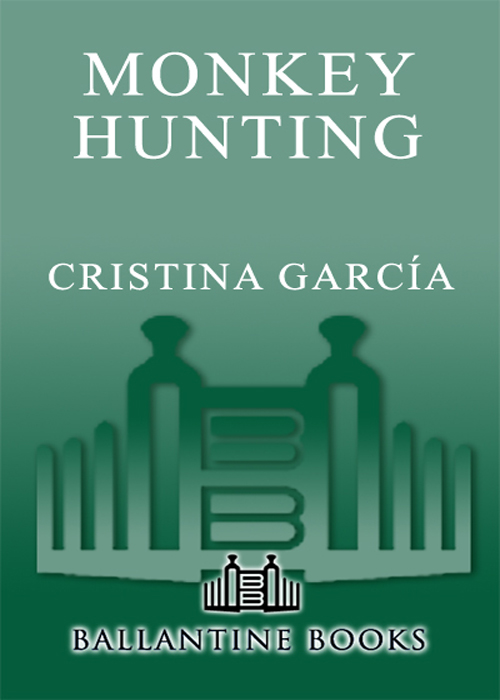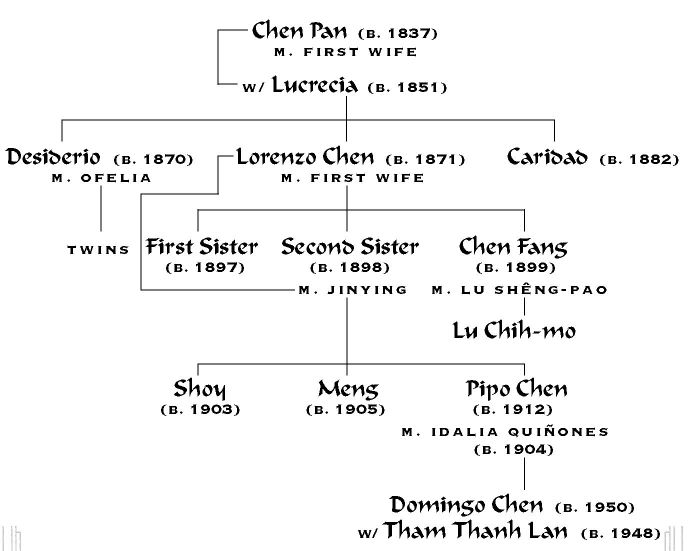Monkey Hunting



Table of Contents
To Paradise - AMOY TO HAVANA (1857)
Vanishing Smoke - CENTRAL CUBA (1857–1860)
The Lucky Find - HAVANA (1867–1868)
Monkeys - CENTRAL HIGHLANDS, VIETNAM (1969)
A Delicate Luck - HAVANA (1888)
The Little War - SANTIAGO TO HAVANA (1912)
MONKEY HUNTING - A Reader’s Guide
For José Garriga
I, Old Monkey, can with this pair
of fiery eyes and diamond pupils,
discern good and evil.
—WU CH’ÊNG-ÊN
The Journey to the West
“RADIANT . . . MESMERIZING . . . A LOVING EXPLORATION OF HERITAGE . . .
García’s grasp of atmosphere is nonpareil and the physicality of her scene setting is intoxicating . . . García writes so well, she puts the reader in the room with her characters. . . .
Monkey Hunting
is a novel of great scope.”
—
Milwaukee Journal Sentinel
“An epic tearjerker . . . The story spans two continents, four generations, several wars, and the rise of two terrible dictators [yet] the focus always remains on the characters, a family of downtrodden dreamers. . . . García’s luminous prose makes palpable the pang of homesickness, the gut-punch of heartbreak. By the end, we are both exhausted from her characters’ incredible journeys and buoyed by their strengths.”
—Time Out New York
“García employs an exuberant prose style in which even the smallest of her torrent of details come heavily jeweled. . . . Escape, family ties, luck, the pull of the homeland—these García trademarks serve here as background and texture to another, more singular matter of the fully lived life.”
—San Francisco Chronicle
“Such is the force of García’s sensual, warm, witty prose [that] I was happy to follow wherever she led. . . . I soon found myself deeply attached to both major and minor characters.”
— The Atlantic
“GORGEOUSLY DETAILED AND ENTRANCINGLY TOLD, EROTIC, MYSTICAL, AND WISE,
García’s bittersweet saga of a family of remarkable individuals spans a century of displacement, war, and sacrifice, and a world of forbearance and love. . . . [García] writes pristinely lyrical and enchanting prose, and creates powerfully alluring characters, delectable qualities she takes to new heights in this many-faceted tale about an extended Chinese Cuban family.”
—Booklist
“Up to now, [García’s] most formidable and affecting characters . . . have been women, extravagant creatures of ripe, even frenzied passions who bloom from the page as colorful as hibiscus blossoms and as huge as Amazons.”
—Miami Herald
“[García] paints a vivid picture of her native Havana, both before and after Castro came to power. . . . Although few Chinese remain in Cuba, their legacy remains in Havana’s Chinatown. García’s eloquent novel is a fitting tribute to their lives.”
—St. Louis Post-Dispatch
“Elegantly written . . . In this multigenerational saga, which embraces many cultures and spans more than a century, Cristina García demonstrates how much the human spirit can endure.”
—Seattle Times/Post Intelligencer
“Graceful . . . Told in unsparing detail . . . Though García ranges further afield here than in previous works, her prose is as tight and polished as ever. . . . [Her] novel is a richly patterned mini-epic, a moving chorus of distinct voices.”
—Publishers Weekly
(starred review)
“A VIVID FAMILY SAGA . . . GARCÍA WRITES BEAUTIFULLY.”
—Austin American-Statesman
“An expert sense of timing and pace . . . This slim book lodges so deeply under the skin. In describing the sensual world, García depicts her characters’ experiences so luminously that it’s easy to feel the pang of their homesickness, the oomph of their heartbreak.”
—The Boston Sunday Globe
“García has a rare gift for concentrating beauty by leaving things out. Here is . . . a novel that manages to trace four generations of a family not by revealing every last detail of personal histories but rather by revealing people’s dreams, their unuttered concerns and observations. . . . Whether she’s writing about the food stalls in Chinatown, the lovingly tended graves in the city’s Chinese cemetery, or even the absurd assortment of curios in the Lucky Find, García savors her descriptions and never rushes through any of them, carefully building for us a Havana of cinematic vividness, detail by shimmering detail.”
—Los Angeles Times Book Review
“In
Monkey Hunting
, author Cristina García does again what she is so adept at: guiding the reader through multiple generations of well-fleshed characters moving through time and place. . . .
Monkey Hunting
[is] a sensuous mosaic of fierce struggles to survive in new worlds. This worthy novel deserves a broad audience.”
—The Oregonian
“Fierce and intoxicating . . . vividly imagined . . .
Monkey
Hunting
is a lucky find, indeed.”
—Miami Herald
“GARCÍA [IS] A LITERARY DAUGHTER MINDFUL OF HER MAGIC REALIST INHERITANCE BUT MAINTAINING A REBELLIOUS, STREETWISE EDGE ALL HER OWN.”
—The New York Times Book Review
“Visceral, poetic, fantastic . . . Sit back. Take it in. Read
MonkeyHunting
for its high-octane poetry, its cocktail of color and incident, its rat-a-tat-tat of vigorous verbs, and Isabel Allende–style eroticism. . . . Glorious images born of a writer who has a gift for splicing together unexpected scenes, cultures, and similes.”
—Chicago Tribune
“At once dreamlike and historically accurate, lushly written and bristling with harsh human truths.”
—L.A. Weekly
“The writing in
Monkey Hunting
is crystalline, occasionally surreal, and nothing short of lovely. There is a rhythm to the narrative that echoes the rich, careful pace of the Cuban days it describes.”
—The Denver Post
“Sage, evocative, and steeped in ancient truths and the strengths and mysteries of family,
Monkey Hunting
is also a tribute to new beginnings and to the protean nature of identity.”
—Elle Magazine
“
Monkey Hunting
is . . . a wondrous collection of tales and family legends that bound from Chinese circuses and Cuban plantations to the jungles of Vietnam . . . filled with ordinary characters who, through blind chance or unbridled drive, do extraordinary things.”
—Los Angeles Magazine
FAMILY TREE

ORIGINS
Prologue
AMOY, CHINA (1857)
Temptations were plentiful in Amoy. At the circus,
Chen Pan watched as the trapeze artist swung from one end of her sagging tent to another in a crimson streak. He followed her soarings, the arc of her willow eyebrows, her delicate steps along the fragile-
seemingtightrope. She wore a spangled bodice and knee-highleather boots. Her legs were straight as bamboo. She
was beautiful, this Fire Swan, calm and disdainful, taller
than any woman Chen Pan had ever seen.
Only a week ago he’d left his village by the J—— River
to look for work in the city. Winter rains had flooded
his wheat fields, rotting the stalks already choked with
darnel. Bandits were roaming the countryside, setting
fires and stealing horses. How far away all this seemed to
him now.
Outside the circus tent, the hills of Amoy scalloped
down to the rim of the sea. Foreign sailors patrolled the
port in their tasseled uniforms. Bedraggled men hauled
crates and burlap bundles, loading the British ships. Near
the docks, a tavern painted with scenes of spring served
warmed wine from jade jars. The owner coaxed Chen Pan
to a back room lined with silk cushions. The night before,
he’d gotten lucky throwing dice against a barge captain.
The winnings were still in his pocket.
A musician was playing an old-fashioned
ch’in,
singing
the lament of a forgotten mistress. Dancing girls in scarlet
skirts beckoned to him like a sea of peonies. Dishes of peas
with aniseed appeared at his table with a generous dippingof wine. The owner offered Chen Pan a carved opium
pipe. He took one puff, then another. Soon the sweet hot
smoke had him searching the clouds for immortals. In the
delicate haze of the ensuing hours, his gambling gold
slowly vanished in the arms of a lush dancing girl.
The following afternoon, a slope-shouldered man with
drooping whiskers invited Chen Pan for tea. What more
did he have to lose? The tea was hot and heavily sugared.
There were sweetmeats and bean paste cakes. The man
wore a Western-style suit and a ring on his little finger,
flecked with diamond chips. His age was impossible to
guess. Chen Pan wanted to believe everything he said.
How the drinking water in Cuba was so rich with mineralsthat a man had twice his ordinary strength (and could
stay erect for days). That the Cuban women were eager
and plentiful, much lovelier than the Emperor’s concubines.That even the river fish jumped, unbidden, into fryingpans. Suddenly the world seemed larger and more
unfathomable than Chen Pan had imagined.
“Spit the country dirt from your mouth!” the man in the
Western suit pressed him. “You need to act while you’re
young! What? Are you waiting for peaches to fall from
heaven?” He counted out eight Mexican coins as a deposit,
pledged four pesos more a month for eight years. “And
remember,” he said, with a quick roll of his shoulders, “one
foreign year elapses twice as fast as a Chinese one!”
But what if the opposite were true, Chen Pan worried.
His father had told him once that a Chinese mile was only
one-third as long as an English one. If this held true for
time as well, he would be gone for twenty-four years.
Chen Pan tried to picture Cuba, an island—the man in
the Western suit explained—that was many times the size
of Amoy. If all went well, Chen Pan speculated, he could
return home a wealthy man, perhaps a stronger man if the
story about the drinking water wasn’t a lie. Then he’d
build a splendid house by the river, huge and on stilts, betterthan any in his village’s memory. He’d buy two or three
more wives, comely and fecund as hens, found his own
dynasty. At the end of his life there would be four generationsof Chens living under one roof.
There would be tales to tell, too, enough to fill many
evenings with his adventures. If only his poor father could
be alive to hear them!
It was winter and fiercely cold. The sun had declined its
duty by midafternoon. In Cuba, Chen Pan was assured,
the air was as tepid as a summer bath all year long. No
more snow or bitter winds. Chen Pan didn’t suffer his
decision. This time, he believed, the odds were in his favor.
He signed the contract, unrolled with a flourish on the littletabletop. Then Chen Pan took his first coin, still warm
from the hands of the man in the Western suit. He would
go beyond the edge of the world to Cuba.